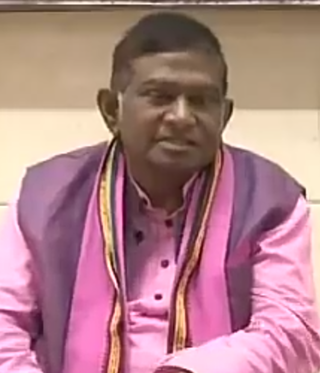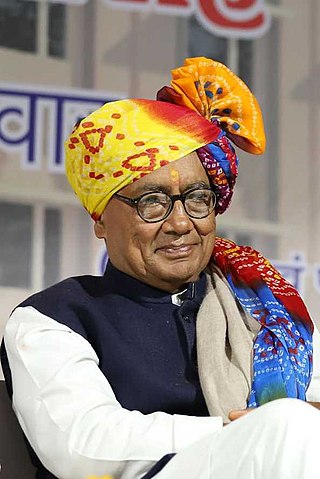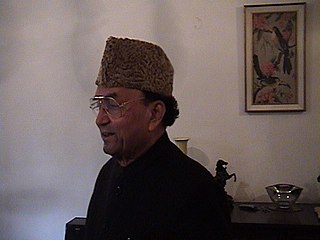
Ajit Pramod Kumar Jogi was an Indian politician, who served as the 1st Chief Minister of Chhattisgarh from 2000 to 2003 and a member of the Chhattisgarh Legislative Assembly from Marwahi from 2018 to 2020 and from 2001 to 2013. He also served as a member of Lok Sabha from Mahasamund from 2004 to 2008 and from Raigarh from 1998 to 1999 and member of Rajya Sabha from Madhya Pradesh from 1986 to 1998 and district collector of Raipur in Office from 1978 to 1981. He was a member of Indian National Congress till 2016 and the founder of the political party named Janta Congress Chhattisgarh and the 1st President of the party from 2016 till he died in 2020.
Sikander Bakht was an Indian politician belonging to the Bharatiya Janata Party (BJP) who served as the 15th governor of Kerala from 2002 until his death. He was elected as the Vice President of the BJP, served as its leader in the Rajya Sabha, and as a cabinet minister in the NDA government headed by Atal Bihari Vajpayee. In 2000, he was awarded Padma Vibhushan, the second highest civilian honour of the Government of India.

The 14th Lok Sabha was convened after the 2004 Indian general election held in four phases during 20 April – 10 May 2004, which led to the formation of first Manmohan Singh ministry (2004–2009). Indian National Congress-led United Progressive Alliance won 62 more seats than previous 13th Lok Sabha. The Lok Sabha is the lower house in the Parliament of India. 8 sitting members from Rajya Sabha, the Upper House of Indian Parliament, were elected to 14th Lok Sabha after the 2004 Indian general election.
Asoka Mehta was an Indian freedom fighter and socialist politician. He helped organize the socialist wing Congress Socialist Party of the Indian National Congress, along with Rambriksh Benipuri, Jaya Prakash Narayan, and was heavily involved in the politics and government of the city of Bombay.
Madhusudan Devram Mistry is an Indian politician belonging to the Indian National Congress.

Digvijaya Singh is an Indian politician and a Member of Parliament in the Rajya Sabha since 2014. He is a senior leader of the Indian National Congress and Ex-General Secretary of the Indian National Congress party's All India Congress Committee. Previously, he had served as the 14th and 15th Chief Minister of Madhya Pradesh, a central Indian state, in two terms from 1993 to 1998 and from 1998 to 2003. Prior to that he was a minister in Chief Minister Arjun Singh's cabinet between 1980 and 1984. In 2019 Indian general election he was defeated by Pragya Singh Thakur for Bhopal Lok Sabha seat.

Vikram Verma is an Indian politician and a leader of the Bharatiya Janata Party (BJP) from Dhar, Madhya Pradesh. He formerly served as a Member of Parliament (MP) in the Rajya Sabha. He also served as a Minister in the Government of India for Youth and Sports Affairs from 2002 to 2004.
Sunder Lal Patwa was an Indian politician, who served as the Chief Minister of Madhya Pradesh and a cabinet minister in the Government of India. He was Chief Minister of Madhya Pradesh twice, from 20 January 1980 to 17 February 1980 and from 5 March 1990 to 15 December 1992.

Bhagwat Dayal Sharma, popularly known as Panditji, was the first Chief Minister of the Indian state of Haryana and later Governor of Odisha and Madhya Pradesh from 30 April 1980 to 14 May 1984. He is one of the greatest leaders of Haryana and his legacy is celebrated even today.

Motilal Vora was an Indian politician belonging to the Indian National Congress (INC).
Narendra Kumar Prasadrao Salve was a veteran Indian politician from Indian National Congress, parliamentarian and a cricket administrator. Former Union minister and president of Board of Control for Cricket in India (BCCI) (1982–1985), he was instrumental in bringing the Cricket World Cup outside England and to the Indian subcontinent in 1987. Salve was a staunch advocate for the separate statehood of Vidarbha.
Khan Shakir Ali Khan, popularly known as Sher-e-Bhopal, was an Indian politician, activist, trade unionist and journalist. A leader of the labour movement in Bhopal, Khan led the struggles for the integration of Bhopal State with India. After Independence he served four tenures as state legislator, representing the Communist Party of India.

Rajni Ranjan Sahu is a former member of parliament (MP) in India. He represented the state of Bihar in Rajya Sabha for two six-year terms (1984–1996) as a member of the Congress party (I).
Shibban Lal Saxena was a former Indian politician and freedom fighter. He was son of late Shri Chhotey Lal Saksena and his uncles were late Shri Shyam Sunder Lal Saksena and late Shri Ram Sunder Lal Saksena. He was born on 13 July 1906 to a wealthy Kayastha Family at Agra.

Shashi Bhushan (1924–2011) was an Indian independence activist, social worker, politician, writer and an institution builder. He was the founder of several organisations such as Rashtriya Ekta Samiti, All India Freedom Fighters' Organisation, Punjab Ekta Samiti and the Institute for Socialist Education, and represented Khargone and South Delhi constituency in the 5th Lok Sabha (1971–1977).
Homi F. Daji was a member of the 3rd Lok Sabha of India. He represented the Indore constituency of Madhya Pradesh and was a member of the Communist Party of India.
Radhakishan Malviya was an Indian politician. He was a member of parliament representing Madhya Pradesh in the Rajya Sabha the upper house of India's Parliament as member of the Indian National Congress.

In 1964, a major split occurred in the Communist Party of India. The split was the culmination of decades of tensions and factional infighting. When India became independent in 1947, differences arose of how to adapt to the new situation. As relations between the Nehru government and the Soviet Union improved, a faction that sought cooperation with the dominant Indian National Congress emerged within CPI. This tendency was led by S.A. Dange, whose role in the party hierarchy became increasingly controversial. When the Sino-Indian War broke out in 1962 Dange's opponents within CPI were jailed, but when they were released they sought to challenge his leadership. In 1964 the party was finally divided into two, with the left faction forming the Communist Party of India (Marxist). The split had a lot of regional variations. It also impacted other organizations, such as trade union and peasant movements. The split has been studied extensively by scholars, who have sought to analyze the various domestic and international factors involved.
Kalyan Roy, also credited as Kalyan Shankar Roy was an Indian politician and a leader of Communist Party of India and also a leader of All India Trade Union Congress. One of the famous trade union leaders of Asansol-Raniganj coalfield area, Kalyan Roy was one of the senior CPI leader and parliamentarian in Rajya Sabha.

Dr. Salig Ram was a medical doctor, freedom fighter, and politician from Himachal Pradesh, India. He belonged to the Indian National Congress. Over 1966–72, he served as a Member of Parliament from Himachal Pradesh in the Rajya Sabha. Over 1972–77, he served as a Minister with various portfolios in the Government of Himachal Pradesh, principally under the Chief Ministership of Y.S. Parmar and later for a brief period under Thakur Ram Lal. He was known as a dissident of Y.S. Parmar.










